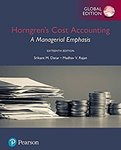US
AU
By Srikant M. Datar and Madhav V. Rajan, 992 pages, Pearson 16th edition, published May 29, 2017
Amazon's Description:
About the book. Use the most current information to prepare students for their field · Emphasis on Global Issues reflect today’s increasingly global business environment, including: · The importance of joint cost allocation in creating a trade war between poultry farms in South Africa and the United States (Chapter 16). · The text’s examples of management accounting applications in companies are drawn from international settings. · Focus on merchandising and service sectors (versus traditional manufacturing settings) highlight the shifts in the US and world economies, including: · Several Concepts in Action boxes focus on the merchandising and service sectors, including achieving cost leadership at Trader Joes, using activity-based costing to reduce the costs of health care delivery at the Mayo Clinic (Chapter 5), reducing fixed costs at Twitter (Chapter 2), and analyzing operating income performance at Best Buy (Chapter 12) and web-based budgeting at 24 Hour Fitness. · Emphasis on sustainability as one of the critical managerial challenges of the coming decades, including: · Material that stress themes of recognizing and accounting for environmental costs, energy independence and the smart grid, setting stretch targets to motivate greater carbon reductions, using cost analysis, carbon tax, and cap-and-trade auctions to reduce environmental footprints, and constructing “green” homes in a cost-effective manner. · More focus on the role of accounting concepts and systems in fostering and supporting innovation and entrepreneurial activities in firms including: · The challenges posed by recognizing R&D costs as period expenses even though the benefits of innovation accrue in later periods. · How companies budget for innovation expenses and develop measures to monitor success of the innovation efforts delinked from operational performance in the current period (Chapter 6). · The importance of nonfinancial measures when making decisions about innovation (Chapter 11). · The concept that innovation starts with understanding customer needs (Chapter 13). · Process innovations for improving quality (Chapter 19). · Cutting-edge topics are covered, including: · Material around recent trends in big data and data analytics in predicting costs and when making demand forecasts. Provide a solid presentation of accounting hallmarks with a great emphasis on strategy · Strategy maps are presented as a useful tool to implement the balanced scorecard and a simplified presentation of how income statements of companies can be analyzed from the strategic perspective of product differentiation or cost leadership. A new section helps students evaluate strategy maps such as the strength of links, differentiators, focal points and trigger points. · Try It examples are simple and focus on key ideas or concepts. They are located after a particular concept or calculation, and invite students to practice what they have just learned. · Becker Multiple Choice Questions in the assignment material probe students’ knowledge of the chapter material and their ability to think critically about key concepts. · Opening Vignettes. Each chapter opens with a vignette on a real company situation. The vignettes get students engaged in a business situation, or dilemma, illustrating why and how the concepts in the chapter are relevant in business. New examples on Quiksilver, General Motors, Boeing, Delta, Honda, and Viacom have been incorporated. · Concepts in Action Boxes. Found in every chapter, these boxes cover real-world cost accounting issues across a variety of industries including automobile racing, defense contracting, entertainment, manufacturing, and retailing. New examples include Subway, Chipotle, H&M, Amazon, Under Armour, and Netflix.
eBook is free at time of posting. Please check price before buying.



It's not showing as $0 for me. Is it expired or the link correct?